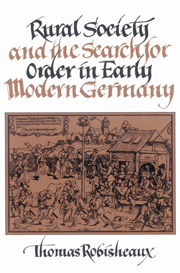Book contents
- Frontmatter
- Contents
- List of illustrations and tables
- Acknowledgments
- A note on usages
- Glossary
- List of abbreviations
- Introduction
- Part One Agrarian expansion, revolt, and the decay of community
- Part Two Search for order
- Part Three Crisis and recovery
- Appendix A Distribution of wealth in Langenburg district, 1528–1581
- Appendix B Grain production and the peasant household
- Manuscript sources
- Bibliographical essay
- Index
- Frontmatter
- Contents
- List of illustrations and tables
- Acknowledgments
- A note on usages
- Glossary
- List of abbreviations
- Introduction
- Part One Agrarian expansion, revolt, and the decay of community
- Part Two Search for order
- Part Three Crisis and recovery
- Appendix A Distribution of wealth in Langenburg district, 1528–1581
- Appendix B Grain production and the peasant household
- Manuscript sources
- Bibliographical essay
- Index
Summary
Problems
This study began ten years ago as a history of rural society in the age of the German Reformation. At that time scholars knew that the majority of the population lived and worked in the countryside, that the village formed the foundation, the cornerstone, of ecclesiastical and secular power, and that the Peasants' War had played a decisive role in shaping the course of the early Reformation. The old view of Leopold von Ranke no longer rang true. To him German villagers exploded onto the scene of the Reformation with the fury of a storm; but they then vanished, as does every storm, within a short time. What had vanished from the history of the Reformation was not the peasantry, however, but Ranke's interest in it. Yet, despite the attention paid the Peasants' War in the mid–1970s and the earlier pioneering work of Wilhelm Abel on the agrarian cycle, little was known of how villagers came to terms with the wrenching changes of the “long sixteenth century” in the German countryside. And these changes had only just begun to be felt in 1525.
This strange neglect of the history of the German peasantry after 1525 was a symptom of a deeper problem. Astonishingly little attention had been paid to German social history as a whole in the early modern period. The historical literature on early modern German history at that time resembled a painting of Caravaggio, Titian, or even Goya.
- Type
- Chapter
- Information
- Publisher: Cambridge University PressPrint publication year: 1989



